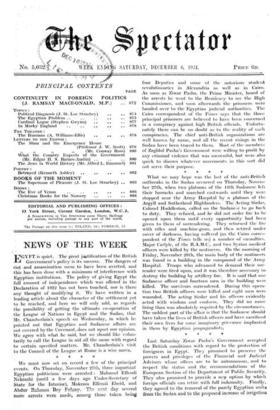What we may hope was the last of the anti-British
outbreaks in the Sudan occurred on Thursday, Novem- ber -27th, when two platoons of the 11th Sudanese left their barracks and marched eastwards until they were stopped near the Army Hospital by a platoon of the Argyll and Sutherland Highlanders. The Acting Sirdar, Colonel Huddleston, called on the Sudanese to go back to duty. They refused, and he did not order fire to be opened upon them until every opportunity had been given to them of surrendering. They returned the fire with rifles and machine-guns, and then retired under cover of darkness, having suffered (as the Cairo corres- pondent of the Times tells us) a number of casualties. Major Carlyle, of the R.A.M.C., and two Syrian medical officers were killed by the mutineers. On the morning of Friday, November 28th, the main body of the mutineers was found in a building in the compound of the -Army Hospital. Troops who advanced to .demand their sur- renderwere fired upon, and it was therefore necessary to destroy the building by artillery fire. It is said that one Sudanese officer and fourteen men in the building were killed. The survivors surrendered. During this opera- tion two British officers were killed and eight men were wounded.. The acting Sirdar and his officers evidently acted with wisdom and coolness. They did no more firing than was absolutely required by the circumstances. The saddest part of the affair is that the Sudanese should have taken the lives of British officers and have sacrificed their own lives for some imaginary grievance implanted in them by Egyptian propagandists.


















































